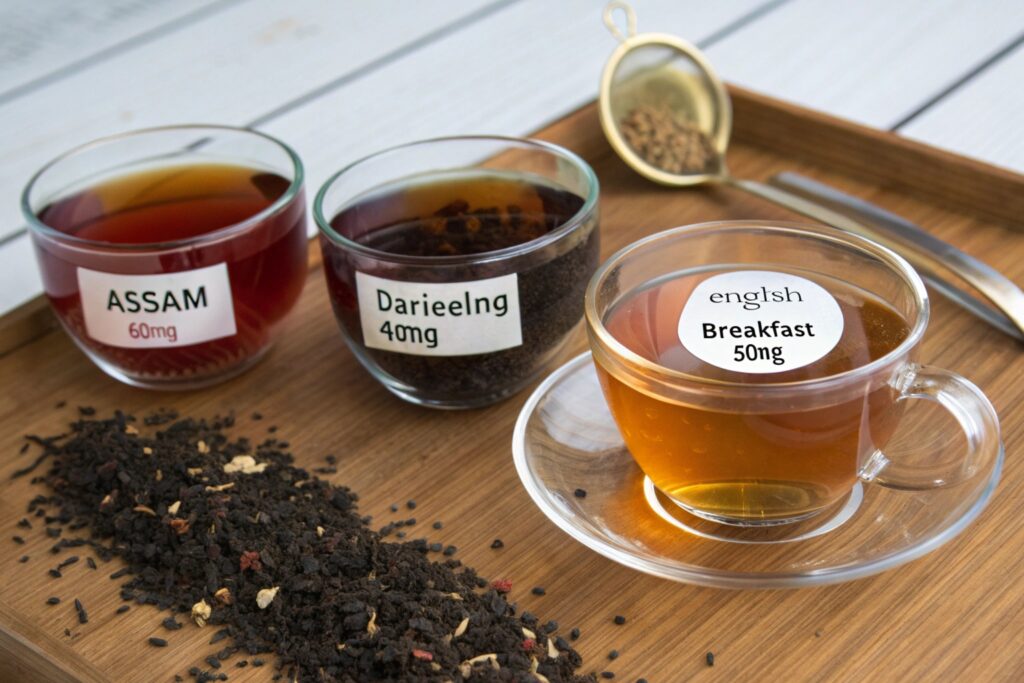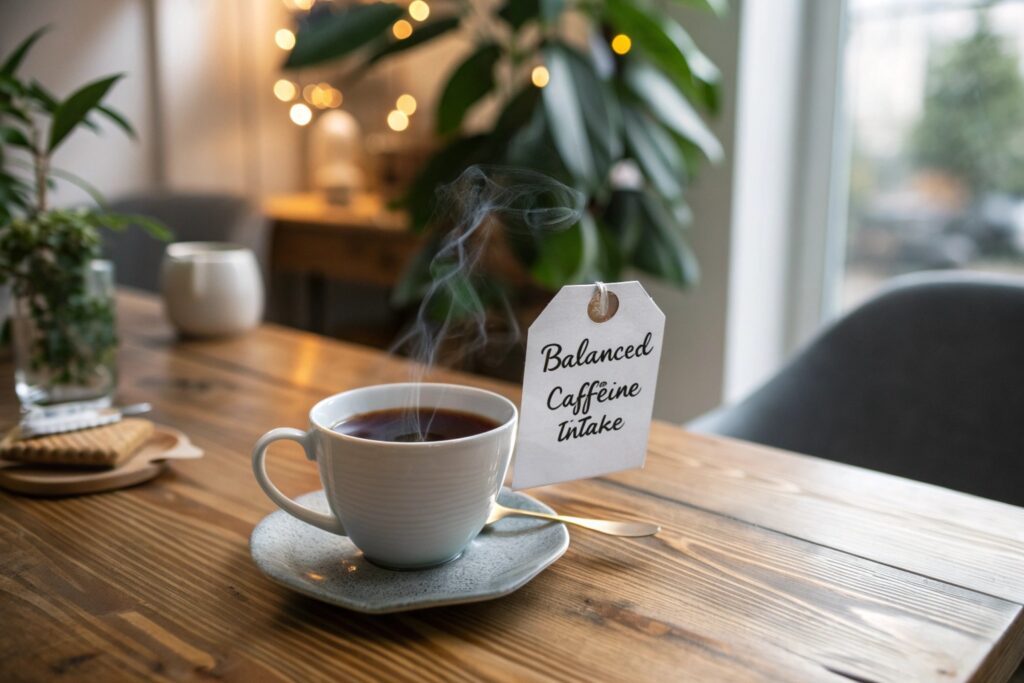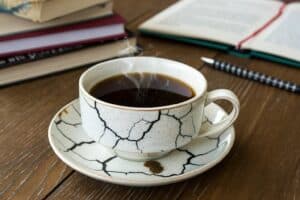How Much Caffeine Is in Black Tea? Everything You Need to Know
Introduction to Black Tea and Caffeine
Do you love sipping on a warm cup of black tea in the morning? 🫖 It’s a comforting ritual for many, but have you ever wondered how much caffeine you’re consuming? Black tea is one of the most popular beverages worldwide, and it owes part of its charm to its caffeine content. Let’s dive into what makes this classic tea so energizing and explore everything you need to know about its caffeine.
Table of Contents
What Is Black Tea?
Black tea is a type of tea made from the leaves of the Camellia sinensis plant. It’s known for its bold flavor and dark color, which comes from a process called oxidation. This is when tea leaves are exposed to air, allowing them to darken and develop their robust taste. Black tea is often enjoyed plain, with milk, or even sweetened with honey. It’s like a warm hug in a mug! 🌟
Why Does Black Tea Contain Caffeine?
Caffeine is a natural stimulant found in tea leaves. Think of it as the plant’s secret energy booster! 🌱 It’s there to protect the leaves from insects and other predators. When you steep black tea, the caffeine is released into your cup, giving you that little energy kick to start your day.
Caffeine Content in Black Tea
So, how much caffeine is in black tea? Let’s break it down.
Average Caffeine Levels in Black Tea
On average, a standard 8-ounce cup of black tea contains about 40–70 milligrams of caffeine. That’s less than coffee, but enough to give you a gentle boost without the jitters. Of course, the exact amount can vary depending on factors like the type of tea and how it’s prepared.
Factors That Affect Caffeine Levels in Black Tea
Here’s where it gets interesting! Several things can influence how much caffeine ends up in your tea:
- Tea Type and Variety: Not all black teas are created equal. Assam tea, for example, tends to have more caffeine than Darjeeling tea.
- Brewing Time and Temperature: The longer and hotter you brew your tea, the more caffeine gets extracted. Want less caffeine? Try a shorter steep time.
- Serving Size and Quantity: Bigger cups mean more tea leaves—and more caffeine. Simple math, right? 🧮
Comparing Caffeine in Black Tea to Other Beverages

Ever wondered how black tea stacks up against other drinks? Let’s compare.
Black Tea vs. Coffee
Coffee is the heavyweight champ of caffeine, with about 95 milligrams per 8-ounce cup. Black tea is milder, making it a great choice for people who want a moderate caffeine boost without overdoing it.
Black Tea vs. Green Tea
Green tea usually has less caffeine—around 20–45 milligrams per cup. If you’re looking for a happy medium between coffee and green tea, black tea is your go-to.
Black Tea vs. Herbal Teas
Here’s the fun part: most herbal teas are naturally caffeine-free! If you’re sensitive to caffeine, herbal teas like chamomile or peppermint are excellent alternatives.
Benefits of Caffeine in Black Tea
Caffeine in black tea isn’t just about energy. It comes with some surprising perks! 🎉
Energy Boost and Alertness
Need to shake off that morning fog? Black tea can help. Its caffeine provides a steady energy release, so you stay alert without feeling like you’re bouncing off the walls.
Improved Mental Focus
Feeling distracted? A cup of black tea can help you concentrate. Caffeine stimulates your brain, improving focus and cognitive function.
Potential Health Benefits of Moderate Caffeine Intake
Believe it or not, caffeine (in moderation) has health benefits! It can boost your metabolism, enhance physical performance, and even lower your risk of certain diseases.
“Caffeine in black tea isn’t just an energy booster; it’s a little helper for your body and mind.”
Nutrition Facts: Black Tea
Here’s a quick look at what you’re getting in a standard cup of black tea:
| Nutrient | Amount (per 8 oz) |
|---|---|
| Calories | 2 (plain tea) |
| Caffeine | 40–70 mg |
| Protein | 0 g |
| Carbohydrates | 0 g |
| Fats | 0 g |
Isn’t it amazing how much goodness fits into one cup?
Common Problems Related to Caffeine in Black Tea
While caffeine can be a great energy booster, it’s not always smooth sailing. Some people face issues with caffeine, even when it’s in something as comforting as black tea. Let’s explore the most common problems and how to address them. 🚨
Caffeine Sensitivity and Side Effects
Ever felt jittery after a cup of tea? Or maybe your heart starts racing like you’ve had a double espresso? That’s caffeine sensitivity. Some people are more sensitive to caffeine, even in small amounts.
Symptoms of caffeine sensitivity:
- Nervousness
- Irritability
- Rapid heartbeat
- Upset stomach
If you notice these signs, it might be time to rethink your tea-drinking habits.
Sleep Disturbances
Caffeine and sleep aren’t the best of friends. If you drink black tea too close to bedtime, you might find yourself tossing and turning. Even a small dose of caffeine can stay in your system for hours. So, if you’re a night owl who loves tea, consider switching to a caffeine-free alternative in the evening. 🌙
Digestive Issues
Caffeine can sometimes irritate the stomach lining, especially if you’re drinking tea on an empty stomach. This might lead to discomfort, acid reflux, or bloating. Black tea is gentler than coffee, but it’s not immune to these effects.
Dehydration Myths and Facts
You might’ve heard that tea dehydrates you. That’s a myth! While caffeine is a mild diuretic, the amount in black tea isn’t enough to cause dehydration. In fact, tea is mostly water, so it can actually contribute to your hydration needs. 💧
Solutions to Manage Caffeine Intake from Black Tea
Now that we’ve covered the potential downsides, let’s look at some easy fixes. Because giving up black tea? That’s not an option for many of us! 🫖
Choosing Low-Caffeine Black Tea Varieties
Some types of black tea naturally have less caffeine. For example:
- Darjeeling tea: Known as the “Champagne of teas,” it’s lighter and typically lower in caffeine.
- Chinese black teas: These often have less caffeine than their Indian counterparts.
Adjusting Brewing Time to Reduce Caffeine
Here’s a fun trick: brew your tea for a shorter time! Steeping for 2–3 minutes instead of 5 can significantly lower the caffeine content. Plus, it gives your tea a milder, more delicate flavor. Win-win! 🎯
Opting for Decaffeinated Black Tea
Decaf black tea is a fantastic option if you’re looking to cut down on caffeine without sacrificing the taste you love. It’s processed to remove most of the caffeine while keeping that rich, bold flavor intact.
Moderating Your Daily Tea Consumption
Let’s be honest: moderation is key. If you’re drinking five cups of black tea a day and feeling jittery, it’s time to scale back. Try sticking to 2–3 cups daily and see how your body responds.
“Your body knows best. Listen to it and find your perfect tea-drinking balance.”
FAQs About Caffeine in Black Tea
Got burning questions about black tea and caffeine? Let’s clear them up. 🔍
How Does Black Tea Compare to Other Caffeinated Drinks?
Black tea is a popular beverage known for its rich flavor and moderate caffeine content. Compared to other caffeinated drinks, it occupies a middle ground. For example:
- Black Tea vs. Coffee: A typical cup of black tea contains about 40-70 milligrams of caffeine, whereas coffee generally provides 95-200 milligrams per cup. This makes black tea a gentler option for those seeking a moderate caffeine boost without the intensity of coffee.
- Black Tea vs. Green Tea: Green tea usually contains less caffeine, with about 20-45 milligrams per cup. Black tea is a stronger choice for those who want a bit more energy.
- Black Tea vs. Energy Drinks: Energy drinks often contain high caffeine levels, ranging from 80 to 200 milligrams per serving, along with added sugars and artificial ingredients. Black tea is a more natural and balanced alternative.
In addition to caffeine, black tea offers antioxidants like flavonoids, which may contribute to health benefits such as improved heart health and better focus.
Can You Completely Remove Caffeine from Black Tea?
While it is not possible to completely remove caffeine from black tea, you can significantly reduce its content through decaffeination or brewing methods:
- Decaffeinated Black Tea: Commercially decaffeinated black tea is processed to remove most of the caffeine, typically leaving less than 2 milligrams per cup. This is an excellent choice for individuals sensitive to caffeine.
- DIY Decaffeination: Steeping black tea for 30 seconds and discarding the liquid can remove a portion of the caffeine. Re-steeping the same tea leaves in fresh hot water will result in a lower-caffeine brew, although not entirely caffeine-free.
- Herbal Alternatives: If complete caffeine elimination is the goal, herbal teas like chamomile or rooibos, which are naturally caffeine-free, can be excellent substitutes.
How Much Black Tea Is Safe to Drink Daily?
Moderation is key when consuming black tea, as excessive intake can lead to side effects like caffeine sensitivity, insomnia, or digestive issues. Most health experts recommend:
Special Considerations: Individuals who are pregnant, breastfeeding, or sensitive to caffeine should limit their intake further, often to 1-2 cups daily or as advised by a healthcare provider.
Daily Limit: Drinking 3-5 cups of black tea per day is generally considered safe for most individuals. This equates to approximately 120-350 milligrams of caffeine, staying within the recommended daily caffeine intake of 400 milligrams for adults.
Conclusion: Balancing Caffeine in Your Tea Routine

Black tea is more than just a drink—it’s a comforting ritual, a pick-me-up, and even a source of health benefits. Understanding its caffeine content allows you to enjoy it responsibly without worrying about side effects. Whether you’re a tea enthusiast or a casual sipper, there’s always a way to make black tea work for you.
So, go ahead, brew that perfect cup of tea. 🫖 Savor the moment, and let the gentle buzz of caffeine carry you through your day. After all, life is too short for bad tea!
Continue your tea journey by discovering The Fascinating World of Earl Grey and Chocolate Pairing.
- Tropical Pineapple Salsa -Fresh, Flavorful, and Easy to Make
- Homemade Salsa for Canning – Honeybunch Hunts
- Easy Homemade Salsa Verde | Complete Guide
- Black Bean Corn Salsa – Fresh and Flavorful Recipe
- Pineapple Salsa That Wows at Every Party
Black Tea Caffeine Content
Equipment
- Tea Kettle
- Tea Strainer
Ingredients
Black Tea
- 1 cup water boiling
- 1 teabag black tea leaves or 1 teaspoon loose leaves
Instructions
- Boil water in a tea kettle.
- Place black tea leaves or tea bag in a cup.
- Pour boiling water over the tea and steep for 3-5 minutes.
- Remove the tea bag or strain loose leaves. Enjoy.

